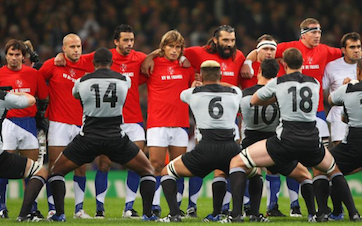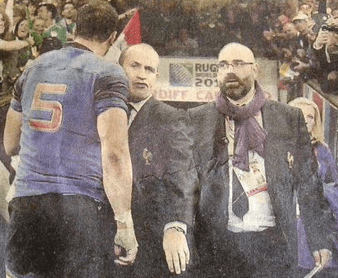Slowly, imperceptibly, the eerily familiar tune has risen, similar to the primitive pulse of the shark motif in Jaws. The time is ripe for another upset; Les Bleus can beat the All Blacks. Saturday night, at the eleventh hour, Rory Kockott will throw a familiar line at his opposite, dejected halfback: “Four more years boet, four more years”, before kicking France to a rather unexpected semifinal.
How did we come this far?
After all, what is tangible, perceptible, measurable, is that France have been nothing short of woeful over the last 4 years. Without embarking on a long-winded speech about the expressions and causes of this dumbfounding mediocrity, let’s have a quick look at a couple of figures and the alleged game plan.
Under PSA, France have played against Top 8 opposition (4 Nations + Wales, Ireland and England) 30 times. They’ve won 6, drawn twice and lost 22. Draws aside, that’s a W/L ratio of 20%. If we factor in home advantage, they’ve only won once outside their bases, and that was against a seriously depleted Argentinian side blooding fresh talent in preparation of the 4 Nations. The French game is an awkward balance between picking players most suited to the game plan (defense – set piece – territory) and picking the best and plan accordingly. This has resulted in a literally monstrous combination of brilliant players antagonized by restrictive instructions and having to play to their weaknesses.
Against them is a team that has lost 3 times over the last 4 years, boasts an ongoing record of 11 consecutive victories at the world cup, and can afford the luxury of benching such average Joes as Sam Cane and Sony William ‘Sonny Bill’ Williams.
The twin myths of French rugby
During the week, news articles and columns have popped up all over the country about how the rabble that lost against Ireland was about to beat the All Blacks in style. In the process, they made reference to two tightly intertwined myths of French rugby: the transfiguration, and the French flair. We shall distinguish them hereafter.
The Transfiguration
In the week leading up to a RWC clash against the All Blacks, the media, the elders and the general public combine to create a properly mythical experience. After a wave of blithering criticism directed at the players and the coaching staff, the rest of the week is spent trying to revive the myth by performing a series of appropriate rites.
Here, rational notions of tactics, game management and strategy give way to instinctive forces and moral values. Making an embarrassing use of military and religious metaphors (“la patrie est en danger”, “soyez transfigurés”), journos call for mobilization, some of them even claiming to have heard about a mutiny; elders remember the glorious days and talk about the fear of humiliation, the players putting their balls on the table, the need to man up & front up; players themselves start to own the language (Bernard Le Roux: “How Do I Respect McCaw ? By smashing the shits out of him”).
The French Flair
Inescapable. Haunting. As imprecise as a Nick Phipps pass after a yo-yo test and a couple of doobies, yet absolutely vital to our chances of success (apparently). Laden with confuse and contradictory meanings, the myth is described by René Deleplace, the man who formalized it, as “the ability of all players to assess and take instantly advantage, freely and responsibly, of the opportunity – shape and direction – provided by each action in general play”.
The French Flair is the exact opposite of set-piece plays, phase plays, or any form of programming. It’s counterattacking at its finest. No amount of skills & drills will teach you how to deal with uncertainty. A single player seizes the opportunity, and the whole team reorganizes collectively and effectively.
Obviously, a number of conditions (preferably cumulative but not necessarily) need to be met for the individual initiative to be successful: a shared understanding of coaches’ instructions; a game plan that does not thwart initiative; collective experience; collective beliefs and values about how the game should be played (do we rather go for the quick recycle from the ruck or do we try to play standing up?).
In 1999, all these conditions were met (one of the coaches was Pierre Villepreux, disciple of Deleplace and a major source of inspiration for some guy called Wayne Smith), unlike in 2007 when the up-against-the-wall attitude and a few other things carried us to victory.
One last time:
Fearless Prediction:
The All Blacks are known for their slow starts, their lack of commitment at the breakdown in defense and possibly their lack of urgency at getting to rucks. They have not shown the aerial skills they were famed for in 2011, and their blindside winger is not a great defender. But they’re also known for the quality of their restarts, their passing game in front of the defense, their deftly-executed set-piece moves and their uncanny ability to exploit and convert each turnover ball and / or clean break. Plus their bench is mental.
France are a rabble. They’ve been utterly predictable (unlike before), they lack leaders, their up & out defense is vulnerable, their set-piece average, they can’t string two phases together and when they do their attack invariably loses shape.
Unless Transfiguration and French Flair combine, New-Zealand by 15.



